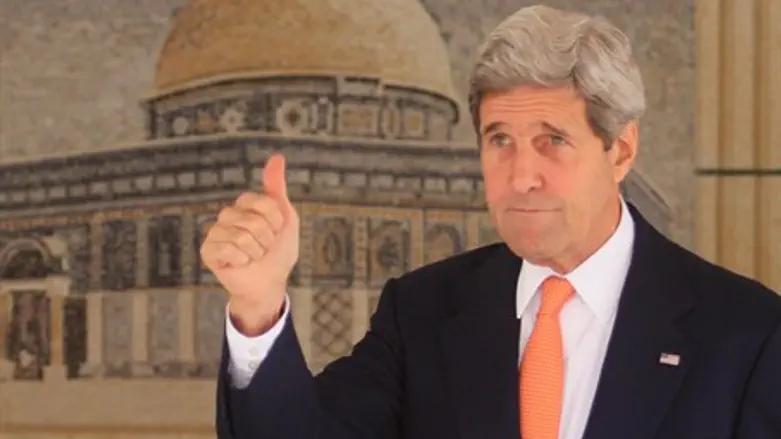
The Palestinian Liberation Organization (PLO), the terror organization behind the Palestinian Authority (PA), called for a comprehensive strategy against Islamic extremism on Saturday - by blaming Israel for rising radicalization a la' the remarks of US Secretary of State John Kerry.
Kerry insisted on Friday that the failure of peace talks between Israel and the PA - not Western apathy to Islamism nor the US's failures to resolve tensions in Iraq - was the culprit for the rise of the Islamic State (ISIS) group, sparking outrage from Israeli officials.
"There wasn't a leader I met... who didn't raise with me spontaneously the need to try to get peace between Israel and the Palestinians, because it was a cause of recruitment and of street anger and agitation," Kerry claimed, blaming Israel for "humiliating" - in his words - Palestinian Arabs.
PLO secretary general Yasser Abed Rabbo agreed to the claim, telling AFP that "linking the fight against terrorism and the end of the Israeli occupation is a strategic position that we support."
The PLO is "ready to work hard with the American administration and all regional leaders to develop mechanisms to implement different levels of the strategic direction announced by Kerry," he said, without elaborating.
Abed Rabbo then took it one step further, claiming that Israelis and Jews offended by the comments are supporting ISIS by default.
"Those who criticize Kerry want the terrorism of the Islamic State organization to continue to use it as an excuse to obstruct a political solution and end to the occupation," he accused.
"We hope that these balanced American statements will reflect on the Palestinian resolution in the (UN) Security Council that will be proposed in the coming days" to call for the establishment of a "Palestinian state" in Judea and Samaria.
Retractions and denials
Kerry's statements sparked fury from Israeli Ministers Friday.
Economy Minister Naftali Bennett (Jewish Home) said that "even when a British Muslim beheads a British Christian there will always be someone who blames the Jews."
Communications Minister Gilad Erdan (Likud) also responded, firing that the remark proved a "lack of understanding" of both the regional situation in general and of the Israeli-Palestinian conflict in particular.
State Department officials scrambled to mollify the outrage.
On Friday night, State Department spokeswoman Marie Harf insisted that Kerry "did not make any linkage between Israel and the growth of ISIL (an alternative acronym for the Islamic State group), period."
Instead, Harf insisted that Kerry had meant merely to emphasize the importance of stabilizing regional conflict in general.
"If we could achieve peace between the Israelis and Palestinians, that would create a more stable region writ large," she said Friday.
Kerry's full comments were later revealed to be as follows, according to a State Department press release:
"I think that it is more critical than ever that we be fighting for peace, and I think it is more necessary than ever. As I went around and met with people in the course of our discussions about the ISIL coalition, the truth is we – there wasn’t a leader I met with in the region who didn’t raise with me spontaneously the need to try to get peace between Israel and the Palestinians, because it was a cause of recruitment and of street anger and agitation that they felt – and I see a lot of heads nodding – they had to respond to. And people need to understand the connection of that. And it has something to do with humiliation and denial and absence of dignity, and Eid [al-Adha; Islamic holiday - ed.] celebrates the opposite of all of that."
"So what we need to do is recognize that we need to build peace through specific partnerships. One partnership is specifically the effort to try to drive towards this peace, to have a compromise, to find a way to create two states that can live together side by side, two peoples, with both of their aspirations being respected. I still believe that’s possible, and I still believe we need to work towards it. We also need to figure out how – and I think what’s happening in Iraq is an interesting beginning of that, where Daesh [ISIS - ed.] has kind of drawn a line and made people stop and think, and Sunni and Shia are beginning to realize there’s a common problem out there and there is a way to try to work together. And the new government gives a breath of fresh air to that possibility that that could happen."
Kerry did juxtapose ISIS and peace talks, even within the full context of his speech, and did link the talks with "recruitment," as demonstrated above.
This is not the first time Kerry's inflammatory remarks have soured US-Israel relations, nor the first time the State Department was forced to backtrack in the face of backlash.
In February, Kerry made a series of comments indicating threats to boycott Israel if peace talks failed. The resulting backlash put a major dampener on US-Israel relations for several weeks, and prompted a flat-out denial of the remarks from State Department officials.
